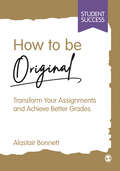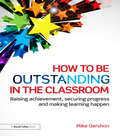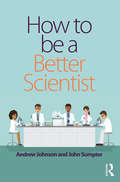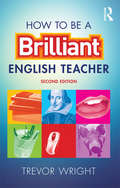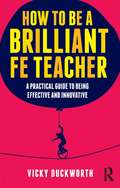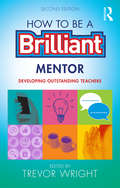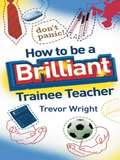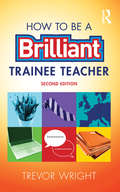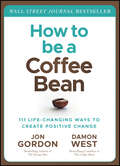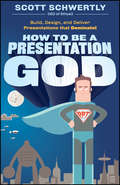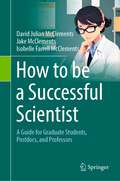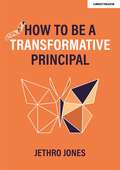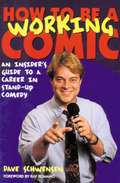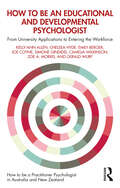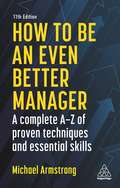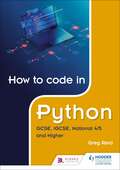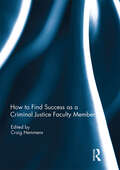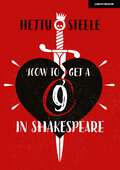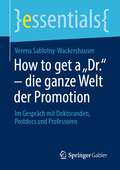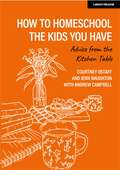- Table View
- List View
How to be Original: Transform Your Assignments and Achieve Better Grades (Student Success)
by Alastair BonnettOriginality is needed to achieve top marks in assignments, but what does it even mean? Simply put, it opens doors: to making a difference; to excellent marks, to success. You’ll often find marking criteria stating you need to make an ‘original contribution’, ‘show originality’, or ‘evidence of originality’, yet it is not taught or even explained. This book addresses this, providing you with the techniques and methods you need to transform your work and achieve better grades. It will even give you the upper hand in the age of AI. Key features include: · Diverse examples of originality in writing · "Try this" exercises, allowing you to develop your skills · Different ways of being original, such as taking photos and drawing maps · Originality in different forms of assignments, such as presentations and exams With the guidance in this book, anyone can be original. Student Success is a series of essential guides for students of all levels. From how to think critically and write great essays to boosting your employability and managing your wellbeing, the Student Success series helps you study smarter and get the best from your time at university.
How to be Original: Transform Your Assignments and Achieve Better Grades (Student Success)
by Alastair BonnettOriginality is needed to achieve top marks in assignments, but what does it even mean? Simply put, it opens doors: to making a difference; to excellent marks, to success. You’ll often find marking criteria stating you need to make an ‘original contribution’, ‘show originality’, or ‘evidence of originality’, yet it is not taught or even explained. This book addresses this, providing you with the techniques and methods you need to transform your work and achieve better grades. It will even give you the upper hand in the age of AI. Key features include: · Diverse examples of originality in writing · "Try this" exercises, allowing you to develop your skills · Different ways of being original, such as taking photos and drawing maps · Originality in different forms of assignments, such as presentations and exams With the guidance in this book, anyone can be original. Student Success is a series of essential guides for students of all levels. From how to think critically and write great essays to boosting your employability and managing your wellbeing, the Student Success series helps you study smarter and get the best from your time at university.
How to be Outstanding in the Classroom: Raising achievement, securing progress and making learning happen
by Mike GershonEvery teacher wants to be outstanding. But what does outstanding mean? And how do we stay outstanding if the goalposts move? In this book, bestselling author Mike Gershon presents you with everything you need to know to make outstanding learning happen in your classroom. It breaks down the nature of outstanding teaching so as to expose the underlying principles which hold true across the curriculum. Featuring advice on all the different elements that contribute to outstanding teaching and learning including assessment, differentiation, literacy, leadership and ensuring progress, it covers: Cultivating the habits of outstanding learning The role assessment plays in planning learning, securing progress and helping students to achieve great outcomes. Leadership and your role as a leader The communication that takes place in the classroom Firmly rooted in the day-to-day experiences of being in the classroom, the book clearly explains the why, the how and what to do if things go wrong! Packed full of clear, easy-to-implement strategies and ideas, it is the text you can call upon time and again in order to cultivate and sustain the habits, actions and thoughts of outstanding teaching.
How to be a Better Scientist: Researching with impact
by Andrew C. Johnson John P. SumpterUnderstanding the fundamentals of conducting good science, that will have an impact, is the goal of every aspiring scientist. Providing a wealth of tips, How to be a Better Scientist is the book to read if you want to succeed in this competitive field. Helping readers gain an insight into what good science means and how to conduct it, this book is ideal to read cover-to-cover or dip into. It includes easily accessible guidance on topics such as: • What characteristics should a scientist have? • Understanding the hypothesis • Integrity in science • Lack of confidence and the embarrassment factor • Time management • Coping with rejection • Interacting with the science community With its broad focus, this friendly guide will enthuse, inspire and challenge, and is an essential companion for all aspiring scientists.
How to be a Brilliant English Teacher
by Trevor WrightNow in its second edition, Trevor Wright’s hugely popular How to be a Brilliant English Teacher is packed with practical advice drawn from his extensive and successful experience as an English teacher, examiner and teacher trainer. This accessible and readable guide offers sound theoretical principles with exciting practical suggestions for the classroom. Fully updated to include a new expanded section on differentiation and inclusion, as well as covering new material on behaviour management and teaching poetry for enjoyment and personal response, this book tackles other tricky areas such as: Starting with Shakespeare Effective planning and assessment Learning to love objectives Working small texts and big texts Drama. Trainee teachers will find support and inspiration in this book and practising English teachers can use it as an empowering self-help guide for improving their skills. Trevor Wright addresses many of the anxieties that English teachers face, offering focused and realistic solutions.
How to be a Brilliant FE Teacher: A practical guide to being effective and innovative
by Vicky DuckworthHow to be a Brilliant FE Teacher is a straightforward, friendly guide to being an effective and innovative teacher in post-compulsory education. Focussing on practical advice drawn from the author’s extensive and successful personal experience of both teaching and training teachers, it offers sound guidance, underpinned by the latest research, theory and policy in the field. Structured around the questions that all new teachers and lecturers ask in their first teaching post, it is an introduction to both essential teaching skills and what to expect from working in this exciting, fast-paced sector. Key chapters cover: The learners – who they are, diversity and motivation; What will actually happen – organising teaching, technology and resources; How to keep your students’ interest – understanding and responding to learning styles; How will I know if they’ve learned it? – assessment and feedback; Making sure it’s working – student evaluation, reflecting on and improving practice. Packed throughout with information about where to find the best materials and resources to support your teaching, this book also offers sensible advice on balancing home and life, working effectively with your colleagues and progressing in your career. How to be a Brilliant FE Teacher will be a source of support and inspiration for all those embarking on their initial training and first post in the sector, as well as qualified professionals looking for reassuring, fresh ideas.
How to be a Brilliant Mentor: Developing Outstanding Teachers
by Trevor WrightHow to be a Brilliant Mentor is an informal and accessible guide that provides ideas and reassurance to help support you in your work as a teacher training mentor. Written by experienced trainers, teachers and mentors, it brings together a wealth of expertise and research, offering clear and practical guidelines to enhance your mentoring, helping you to analyse your own practice and understand the complex and often ambiguous role of the mentor in school. The second edition includes new chapters on school-based training routes, dealing with their advantages and challenges, and on developing trainees through risk taking. All chapters have been updated to refer to the new National Standards for school-based initial teacher training (ITT) mentors.Offering practical strategies and direct problem-solving to help you move promising trainees quickly beyond mere competence, it explores: giving effective feedback emotional intelligence and developing and maintaining relationships collaborative working dealing with critical incidents developing reflective practice what to do if relationships break down the relationship between coaching and mentoring mentoring newly qualified teachers (NQTs) as well as trainees. Illustrated with the experiences of real trainees, How to be a Brilliant Mentor can be dipped into for innovative mentoring ideas or read from cover to cover as a short enjoyable course which will give you added confidence in your mentoring role. The book is a companion to How to be a Brilliant Trainee Teacher, also by Trevor Wright.
How to be a Brilliant Trainee Teacher: Developing Outstanding Trainees
by Trevor WrightThis cheerful and accessible book is packed with direct and straightforward advice drawn from the author s extensive and successful personal experience as teacher-trainer, teacher and examiner. It sets out clear and practical guidelines to support your training and enhance your teaching, moving you directly towards a real understanding of how and why pupils learn and of how you can enhance your own progress. It also offers reassurance and support with the difficulties which you might encounter through your training as a teacher. Why won t Year 8 actually do anything? Why do we have to read all this theory? I know my pace and timing need improvement, but what do I actually do about it? Why haven t I moved forward at all in the last four weeks? It does this by: outlining strategies for organization exploring issues of personal development demystifying areas often seen as difficult or complex providing achievable and practical solutions directly addressing anxieties. Although a practical book, at its heart lie essential principles about good teaching and learning. It is anecdotal and readable, and may be dipped into for innovative lesson ideas or read from cover-to-cover as a short, enjoyable course which discovers exciting teaching principles in successful, practical experience. The book is ideal for secondary trainee teachers, but the underlying principles about what makes a brilliant trainee teacher are applicable to primary trainees too. "
How to be a Brilliant Trainee Teacher: Developing Outstanding Trainees
by Trevor WrightHow to be a Brilliant Trainee Teacher sets out clear and practical guidelines to support your training and enhance your teaching, moving you directly towards a real understanding of how and why pupils learn and how you can enhance your own progress. This second edition has been updated to offer you timely advice that has been drawn from the author’s extensive and successful personal experience as a teacher-trainer, teacher and examiner. The book offers reassurance and support with the difficulties you might encounter through your training as a teacher. Why won’t Year 8 actually do anything? Why do we have to read all this theory? I know my pace and timing need improvement, but what do I actually do about it? Why haven’t I moved forward at all in the last four weeks? It does this by: · outlining strategies for organisation; · exploring issues of personal development; · demystifying areas often seen as difficult or complex; · providing achievable and practical solutions; · directly addressing anxieties. Although a practical book, at its heart lie essential principles about good teaching and learning. It is anecdotal and readable, and may be dipped into for innovative lesson ideas or read from cover to cover as a short, enjoyable course that discovers exciting teaching principles in successful, practical experience. How to be a Brilliant Trainee Teacher is ideal for secondary trainee teachers, but the underlying principles about what makes a brilliant trainee teacher are applicable to primary trainees too.
How to be a Coffee Bean: 111 Life-Changing Ways to Create Positive Change (Jon Gordon)
by Jon Gordon Damon WestCreate positive and lasting change in your life with proven concepts from The Coffee Bean In How to be a Coffee Bean, bestselling coauthors of The Coffee Bean, Jon Gordon and Damon West, present 111 simple and effective strategies to help you lead a coffee bean lifestyle—one full of healthy habits, encouragement, and genuine happiness. From athletes to students and executives, countless individuals have been inspired by The Coffee Bean message. Now, How to be a Coffee Bean teaches you how to put The Coffee Bean philosophy into action to help you create real and lasting change in your life. How to be a Coffee Bean presents thought-provoking ideas to help you create positive change, including: How to fuel your mind, body, and soul to energize yourself and others How to make a difference in the lives of others every day How to look for opportunities to be a messenger of hope and perseverance through your background, experiences, successes, and failuresEasy to implement, practical, proven, and highly effective, How to be a Coffee Bean shows you how to put the powerful lessons from The Coffee Bean into practice. It’s a must-read for anyone looking to live their best life and impact and transform the people and environment around them.
How to be a Presentation God
by Scott SchwertlyHow to build, design, and deliver a fire-breathing, wing-flapping, roar-bellowing behemoth of a presentationUnlike most presentation books that say the same things regarding presentation design and delivery (less is more, get rid of bullets and use images, emulate Steve Jobs, and so on), How to Be a Presentation God actually divulges step-by-step secrets for how to build, design, and deliver blockbuster presentations.By providing entertaining and clever presentation insights, veteran presenter Scott Schwertly gives you the in's and out's for presenting yourself, your business, and your cause with an easy-to-implement approach.Focuses on content, design, and deliveryAuthor is a regular speaker at national and regional industry conferences such as PowerPoint Live and Presentation Camps, and is the founder of the award-winning Ethos3 CommunicationsAuthor is the creator of an app, Present, that landed in the top-20 iPhone apps in the Business category on iTunesHow to be a Presentation God will ensure that your presentations reach a new level of effectiveness.
How to be a Successful Scientist: A Guide for Graduate Students, Postdocs, and Professors
by David Julian McClements Jake McClements Isobelle Farrell McClementsThis book provides important advice to scientists at all stages of their careers on how to be a more effective and impactful researcher. It provides tips on: designing, performing, and analyzing experiments; writing, submitting and revising manuscripts; preparing and giving scientific talks and posters; writing grant proposals; and writing and defending a graduate thesis. It also provides advice on soft skills, like communication, networking, creativity, critical thinking, and working in teams. A major emphasis of the book is the importance of writing and publishing scientific manuscripts, as this is the main way that scientific knowledge is disseminated, as well as being an important element for building a strong curriculum vitae. The book should be an extremely valuable resource for graduate students throughout their studies but should also be useful for postdocs and professors who want to hone their research skills. The book is written by three scientists from the same family who are each at different stages in their careers and can therefore provide different perspectives. David Julian McClements is a distinguished professor who is currently the most highly cited author in Food Science in the world. He has published over 1300 scientific articles and numerous books. Jake McClements is beginning his career as a lecturer in the United Kingdom, while Isobelle Farrell McClements is just starting her career as a graduate student in the United States.
How to be a Successful Teacher: Strategies for Personal and Professional Development
by Scott Buckler Paul CastleTeaching is a rewarding, yet demanding profession, one in which a person needs to be fully prepared. This book focuses on the applied psychological skills, strategies and resources, which will help to ensure you are equipped with personal and professional expertise to survive in the classroom. In the book you will find: - An overview of important psychological themes within teaching such as confidence, motivation and self esteem - Explorations of physical issues related to successful psychological functioning, such as fitness and nutrition - Advice and activities which will show you how to learn and use psychological skills and techniques directly Readily accessible to a wide audience, including internationally, the book assumes no prior knowledge of psychology. The authors give specific examples taken from a diverse range of professional situations, always with relevant theoretical underpinning, and the structure allows you to dip in and out of chapters and sections. The text provides support to students on teacher training courses at both undergraduate and postgraduate level. It will also help teachers in their formative professional years.
How to be a Transformative Principal
by Jethro JonesBeing a principal requires you to serve many different people. The job can feel overwhelming. But it does not need to feel that way. Because many principals have already figured out what works and how to be great.This book is the culmination of over 400 interviews the author conducted on his Transformative Principal Podcast and these interviews hold the key to finding success as a principal – a principal that is not just trying to lead a school but making lasting change that will make their school better for their students. With insight from some of the greatest minds in education and some of the best principals that nobody has ever heard of, Jones distils the secrets to success into small action steps you can take to make your school amazing. Jones relates stories of great success, horrific failures, and everything in between. The book is structured to help you focus on one area in each month for a school year. Truly, you can start anywhere and work on that piece in that month. Further, each chapter has activities to help you make improvements in each area. Whether you are a brand-new principal or working in your 32nd year in a school, this book will help you improve your leadership.
How to be a Transformative Principal
by Jethro JonesBeing a principal requires you to serve many different people. The job can feel overwhelming. But it does not need to feel that way. Because many principals have already figured out what works and how to be great.This book is the culmination of over 400 interviews the author conducted on his Transformative Principal Podcast and these interviews hold the key to finding success as a principal – a principal that is not just trying to lead a school but making lasting change that will make their school better for their students. With insight from some of the greatest minds in education and some of the best principals that nobody has ever heard of, Jones distils the secrets to success into small action steps you can take to make your school amazing. Jones relates stories of great success, horrific failures, and everything in between. The book is structured to help you focus on one area in each month for a school year. Truly, you can start anywhere and work on that piece in that month. Further, each chapter has activities to help you make improvements in each area. Whether you are a brand-new principal or working in your 32nd year in a school, this book will help you improve your leadership.
How to be a Working Comic: An Insider's Guide to a Career in Stand-Up Comedy
by Dave SchwensenGetting ahead in stand-up comedy means having an original slant on things. Many books and comedy classes offer "secrets" and "formulas" intended to make the aspiring comic a big success. In How to Be a Working Comic, author Dave Schwensen points out that the performers who are in demand never follow the same path--and neither should you if you want to excel in this demanding, competitive profession. Offering more insiders' advice than any other manual, this book shows you how to try out material; get onstage experience; market your act to talent bookers, agents, and managers; go on the road; get on television, and much more. Supplementing the author's own expertise are his interviews with more than sixteen proven talents, including Drew Carey, Carrot Top, Jeff Foxworthy, and Tommy Smothers--all of whom embody the qualities of originality, career know-how, and laughter. Schwensen assumes you already believe you're funny enough to tackle a comedy career. Making sure you develop a comic vision that's completely your own is the essential lesson in starting out in the exciting but crowded field of stand-up comedy.
How to be an Educational and Developmental Psychologist: From University Applications to Entering the Workforce (How to be a Practitioner Psychologist in Australia and New Zealand)
by Kelly-Ann Allen Chelsea Hyde Emily Berger Joe Coyne Simone Gindidis Camelia Wilkinson Zoe A. Morris Gerald WurfWritten in a clear and accessible style, this book presents a wealth of practical information to guide the next generation of educational and developmental psychologists in Australia and New Zealand in pursuing a career in the field. There are over 800 educational and developmental psychologists in Australia, and over 200 educational psychologists in New Zealand, who represent a diverse workforce. Pathways to becoming an educational and developmental psychologist have seen rapid shifts with updated key competencies that prospective educational and developmental psychologists need to be aware of. This book gives the reader a comprehensive understanding of what makes an educational and developmental psychologist and outlines seven steps required to become an endorsed educational and developmental psychologist. Specifically, it offers guidance on understanding the role and its history, tertiary study requirements, registration requirements, professional competencies, skills and attributes needed, work experience, professional associations and member groups, endorsement and supervision requirements, finding work, and starting work. With a primary focus on Australia, each chapter also features a section on the career in New Zealand, with a variety of psychologists sharing their expertise and reflections from their experiences in New Zealand. This resource is essential reading for students, provisional psychologists, and practising psychologists. At the same time, it provides insights for other educational and health professionals who may work multi-, inter-, or transdisciplinary with educational and developmental psychologists.
How to be an Even Better Manager: A Complete A-Z of Proven Techniques and Essential Skills (Motivation Cassettes Ser.)
by Michael ArmstrongDon't just be a good manager... be an even better one.For current and aspiring managers alike, this bestselling handbook from expert author Michael Armstrong provides a whistle-stop tour of the skills and techniques you need to succeed. With a focus on practical application, you will be guided through four crucial areas of management:-Managing people-Management activities and processes-Management personal skills-Business and financial skillsHow to be an Even Better Manager has sold over 170,000 copies worldwide and been translated into 17 languages. Fully revised and updated, this 11th edition covers all the skills an excellent manager needs, and now includes brand new case studies to ensure you will be equipped for the modern world of management. From resolving conflict and boosting your confidence to engaging your team and improving their performance, with this trusted and popular guide you won't just be good - you'll be an even better manager.
How to code in Python: GCSE, iGCSE, National 4/5 and Higher
by Greg ReidEnsure every student can become fluent in Python with this highly practical guide that will help them understand the theory and logic behind coding.Written for 14-16-year olds by a leading Python specialist and teacher, and aligned to curriculum requirements, this essential Student Book provides numerous practice questions and coding problems that can be completed as homework or during class - plus answers can be found online at www.hoddereducation.co.uk/pythonextrasHow to Code in Python will:> Provide hundreds of coding examples, puzzles and problem-solving tasks to strengthen computational thinking skills required for GCSE, iGCSE and National 4 / 5 success> Help students become proficient in computational thinking and problem-solving using Python> Provide easy-to-follow explanations of concepts and terminology> Feature plenty of opportunities for self-assessment with solutions to coding problems available onlineThis unique book can be broken down into three key features:> Code theory and explanations (worked examples) in a fun and accessible way> Computational thinking puzzles for the reader to solve; this will greatly improve students' ability to read code and predict its effect and output when run> Programming problems where the reader has to write a program to solve given scenariosGreg Reid is a very experienced Computer Science teacher in Scotland, who has written How to Pass Higher Computer Science and Higher Computing Science Practice Papers for Hodder Gibson.
How to code in Python: GCSE, iGCSE, National 4/5 and Higher
by Greg ReidEnsure every student can become fluent in Python with this highly practical guide that will help them understand the theory and logic behind coding.Written for 14-16-year olds by a leading Python specialist and teacher, and aligned to curriculum requirements, this essential Student Book provides numerous practice questions and coding problems that can be completed as homework or during class - plus answers can be found online at www.hoddereducation.co.uk/pythonextrasHow to Code in Python will:> Provide hundreds of coding examples, puzzles and problem-solving tasks to strengthen computational thinking skills required for GCSE, iGCSE and National 4 / 5 success> Help students become proficient in computational thinking and problem-solving using Python> Provide easy-to-follow explanations of concepts and terminology> Feature plenty of opportunities for self-assessment with solutions to coding problems available onlineThis unique book can be broken down into three key features:> Code theory and explanations (worked examples) in a fun and accessible way> Computational thinking puzzles for the reader to solve; this will greatly improve students' ability to read code and predict its effect and output when run> Programming problems where the reader has to write a program to solve given scenariosGreg Reid is a very experienced Computer Science teacher in Scotland, who has written How to Pass Higher Computer Science and Higher Computing Science Practice Papers for Hodder Gibson.
How to find success as a Criminal Justice faculty member
by Craig HemmensProfessional development is an issue of interest to all criminal justice faculty, from the newest Assistant Professor to the most senior Full Professor. The annual Academy of Criminal Justice Sciences conference has a number of panels and workshops that deal with the wide variety of issues that criminal justice faculty deal with as they move though their career. These panels are well-attended, attesting to the interest that faculty have in this topic. Given the importance of staying apprised of changes in the discipline, from hiring expectations to tenure and promotion requirements, the fact that academic study of criminal justice has changed a great deal in the past decade, and that more is now expected of graduate students, pre-tenure faculty, and even senior faculty, this book is an attempt to address some of the most important topics that those engaged in the academic study of criminal justice are faced with as they move through their career. Each chapter is written by a well-regarded academic with experience in the area upon which they are writing. This book was originally published as a special issue of the Journal of Criminal Justice Education.
How to get a 9 in Shakespeare
by Hetty SteeleAre you confident with poetry, an expert in Dickens, at ease with modern drama, but a bit more unsure when it comes to Shakespeare? Then this is the guide for you.Lots of students find Shakespearean language and content the hardest element of the GCSE English Literature course; this book gives you practical strategies you can use to make sure you can access those very top grades. Are you giving the examiner your own personal opinion on the extract? Have you picked out the most important quotes, and broken them down? Does it link to the play as a whole? This guide gives you a range of ways to make sure you’re doing all this and more, and that you achieve as close to full marks as possible, every time.Broken down into the two most frequently studied Shakespearean plays at GCSE (Macbeth and Romeo and Juliet), you can find the text that you need and become an expert in all things Shakespeare. No more woolly points, no more skirting away from analyzing pentametre, no more generic ‘Shakesperean audiences hated…’ It’s time to focus on the 9s.
How to get a 9 in Shakespeare
by Hetty SteeleAre you confident with poetry, an expert in Dickens, at ease with modern drama, but a bit more unsure when it comes to Shakespeare? Then this is the guide for you.Lots of students find Shakespearean language and content the hardest element of the GCSE English Literature course; this book gives you practical strategies you can use to make sure you can access those very top grades. Are you giving the examiner your own personal opinion on the extract? Have you picked out the most important quotes, and broken them down? Does it link to the play as a whole? This guide gives you a range of ways to make sure you’re doing all this and more, and that you achieve as close to full marks as possible, every time.Broken down into the two most frequently studied Shakespearean plays at GCSE (Macbeth and Romeo and Juliet), you can find the text that you need and become an expert in all things Shakespeare. No more woolly points, no more skirting away from analyzing pentametre, no more generic ‘Shakesperean audiences hated…’ It’s time to focus on the 9s.
How to get a „Dr.“ – die ganze Welt der Promotion: Im Gespräch mit Doktoranden, Postdocs und Professoren (essentials)
by Verena Sablotny-Wackershauseressentials liefern aktuelles Wissen in konzentrierter Form. Die Essenz dessen, worauf es als „State-of-the-Art“ in der gegenwärtigen Fachdiskussion oder in der Praxis ankommt. essentials informieren schnell, unkompliziert und verständlichals Einführung in ein aktuelles Thema aus Ihrem Fachgebietals Einstieg in ein für Sie noch unbekanntes Themenfeldals Einblick, um zum Thema mitreden zu könnenDie Bücher in elektronischer und gedruckter Form bringen das Expertenwissen von Springer-Fachautoren kompakt zur Darstellung. Sie sind besonders für die Nutzung als eBook auf Tablet-PCs, eBook-Readern und Smartphones geeignet. essentials: Wissensbausteine aus den Wirtschafts-, Sozial- und Geisteswissenschaften, aus Technik und Naturwissenschaften sowie aus Medizin, Psychologie und Gesundheitsberufen. Von renommierten Autoren aller Springer-Verlagsmarken.
How to homeschool the kids you have: Advice from the kitchen table
by Andrew Campbell Courtney Ostaff Jenn NaughtonIn How to Homeschool the Kids You Have, three veteran home educators lead you through the process of creating a custom educational plan that works for your family's unique situation and your children's needs. You'll identify your own educational priorities and learn how to translate them into a strong academic program. You'll also learn about what science tells us about how humans- especially young humans-learn, and why that information is crucial for the success of your homeschooling plans. Along the way, the authors share their own experiences and those of other homeschoolers to help you avoid pitfalls so you can provide your children with the excellent education that is their birthright.
